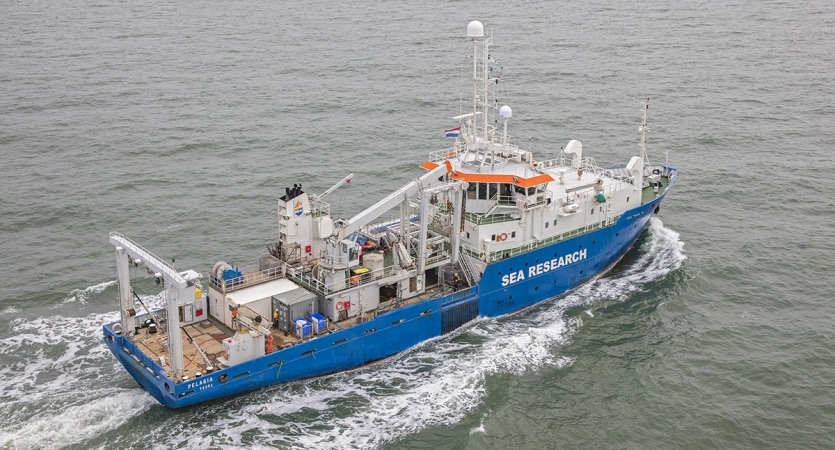Delft researchers want to investigate how salt and nutrients are transported by ocean currents and how submarine groundwater discharge affects coral reefs. They are taking part in a large research expedition across the ocean aboard the research vessel RV Pelagia, which sailed last week.
RC Pelagia will sail south to Gran Canaria, then cross over to Curaçao and Sint Maarten before heading back via Ireland. (Photo: NIOZ)
The almost 130 scientists aboard the RV Pelagia – the research ship of the Royal Netherlands Institute for Sea Research (NIOZ) – will study the changing oceans over the next seven months. How can we gain a better grasp of the opportunities and threats for the seas? That is the central question of this expedition called NICO (Netherlands Initiative Changing Oceans).
The ship will sail south to Gran Canaria, then cross over to Curaçao and Sint Maarten before heading back via Ireland. Delft researchers will join the crew in the Caribbean.
Not for the faint-hearted
Right from the start, the expedition proved not to be for the faint-hearted. With high waves and a wind force of 7 Beaufort, RV Pelagia left its home port of Texel – where the NIOZ is based – last Wednesday, two days later than planned. The crew encountered some unexpected technical problems.
One of the fuel tanks leaked and needed repair. “Nothing to worry about,” said Thomas de Greef, head of the NIOZ marine facilities. “This is a common problem with old ships like the Pelagia. The metal just gets thinner over the years.” The ship is still seaworthy, however, he emphasized.
“Maybe it is actually a good thing that I will not be on board the ship myself to do the experiments,” said oceanographer Dr. Caroline Katsman, laughing. Katsman, who works at the Faculty of Civil Engineering and Geosciences (CEG), is an expert in whirls in the ocean, also called eddies, and how these large, slowly spinning vortices affect ocean currents. She designed a measurement programme that will take place over several months when the ship sails the Caribbean.
‘We will measure up to 5 km depth’
“My colleague Carine van der Boog and a couple of students will perform measurements along a transect that cuts right through an eddy with a diameter of over 100 km between the islands of Aruba and Sint Maarten. They will measure the salinity and temperature at depths of up to 5 km. This promises to be interesting because until now, we have only observed eddies superficially with satellites.”
Eddies are interesting according to Van der Boog because they affect ocean currents at large and as such the earth’s climate. Moreover, due to their higher temperature, they may also fuel hurricanes.
The team is collaborating with biologists from Wageningen University who will take water samples to study the plankton. Since the salinity and temperature of the water in the eddy differ from that of the water outside, it is believed that the fauna also differs. The researchers will also study marine mammals, seabirds, turtles and large fish species like sharks and sunfish.
‘We want to get a clear picture of the hydrology of the island’
On the island of Curaçao, hydrologist Boris van Breukelen (CEG Faculty) will hop on board. Together with colleagues from Wageningen University and the University of Amsterdam, he will investigate where and to what extent groundwater from the island flows into the ocean.
“We want to get a clearer picture of the hydrology of the island and the surrounding sea. The groundwater contains a lot of pollutants, like nitrates and phosphates, that cause algal growth and threaten the coral reefs.”
Just like all the other researchers, Katsman’s team and Van Breukelen have very limited time – about a week – to perform all their measurements. Katsman explained, “It was a very complicated logistical puzzle to fit all the research in the seven-month period.”
More articles about this expedition will follow in February next year when the Delft researchers sail across the Caribbean.
Do you have a question or comment about this article?
tomas.vandijk@tudelft.nl


Comments are closed.